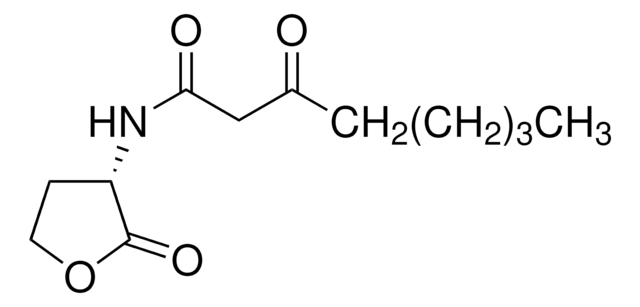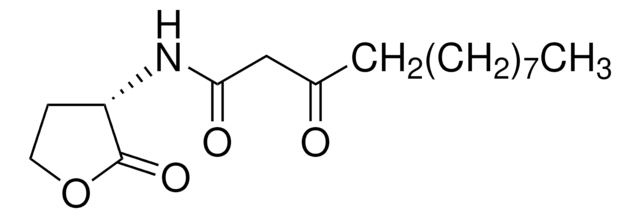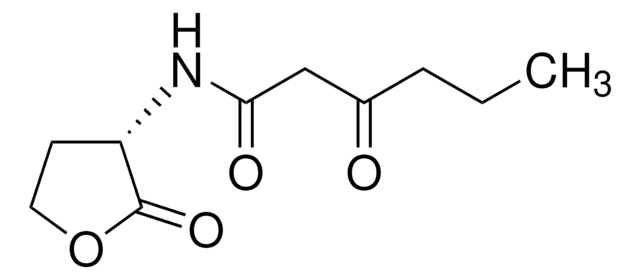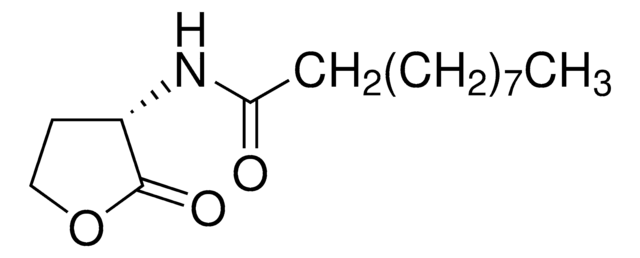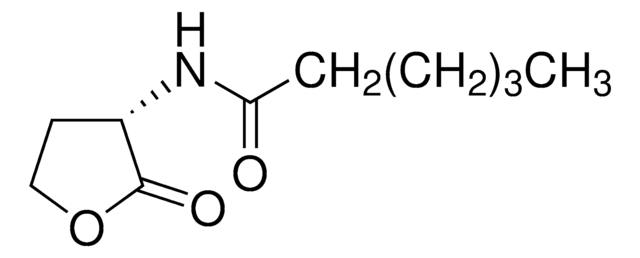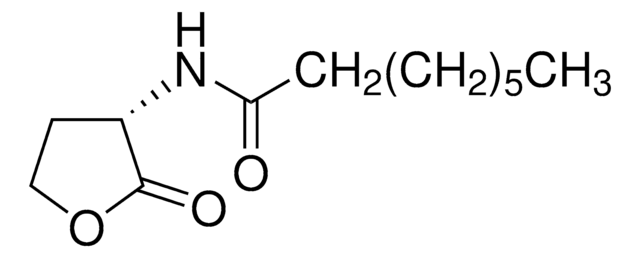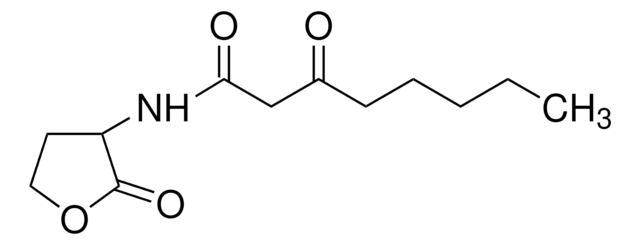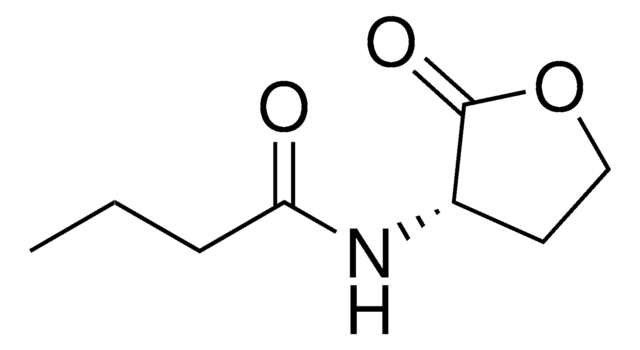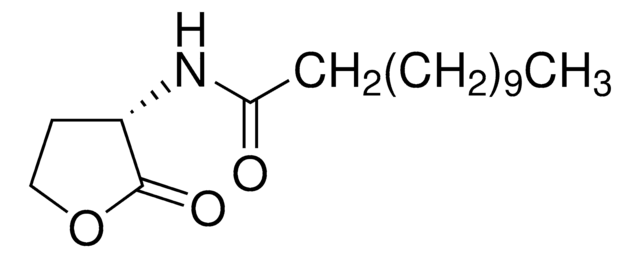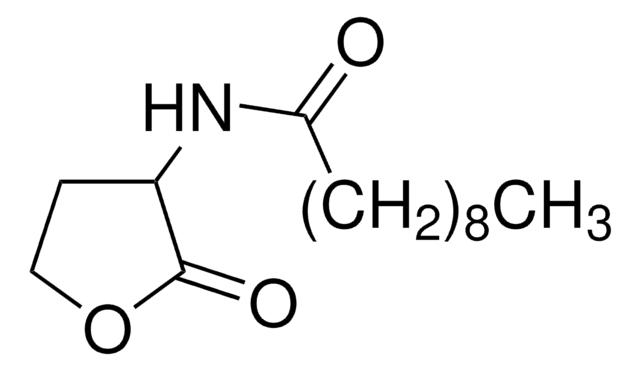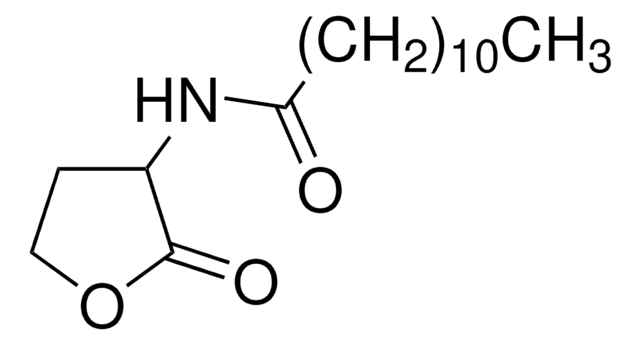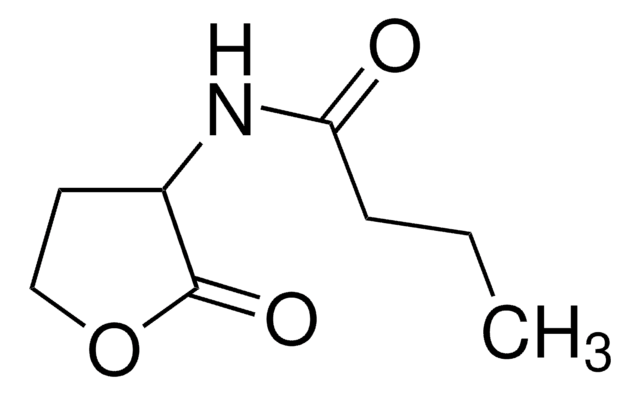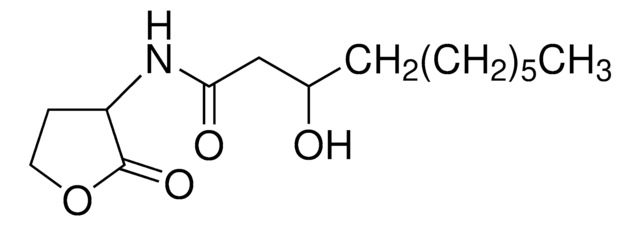O9014
N-(3-Oxodecanoyl)-L-homoserine lactone
≥98% (TLC)
Sinonimo/i:
3-Oxo-N-[(3s)-2-Oxotetrahydrofuran-3-Yl]decanamide
Autenticatiper visualizzare i prezzi riservati alla tua organizzazione & contrattuali
About This Item
Formula empirica (notazione di Hill):
C14H23NO4
Peso molecolare:
269.34
Numero MDL:
Codice UNSPSC:
12352209
eCl@ss:
32160406
ID PubChem:
NACRES:
NA.26
Prodotti consigliati
Nome del prodotto
N-(3-Oxodecanoyl)-L-homoserine lactone,
Saggio
≥98% (TLC)
Livello qualitativo
Stato
powder
Colore
white
applicazioni
cell analysis
Condizioni di spedizione
wet ice
Temperatura di conservazione
−20°C
Stringa SMILE
CCCCCCCC(=O)CC(=O)N[C@H]1CCOC1=O
InChI
1S/C14H23NO4/c1-2-3-4-5-6-7-11(16)10-13(17)15-12-8-9-19-14(12)18/h12H,2-10H2,1H3,(H,15,17)/t12-/m0/s1
KYGIKEQVUKTKRR-LBPRGKRZSA-N
Categorie correlate
Descrizione generale
N-(3-oxodecanoyl) homoserine-L-lactone (3-oxo-C10 HSL) is among belongs to the group of homoserine lactones that includes N-octanoyl-homoserine lactone (N-C8-HSL), N-(3-oxododecanoyl)homoserine-L-lactone (3-oxo-C12-HSL), N-(3-Oxotetradecanoyl)-L-homoserine lactone (3-oxo-C14-HSL, N-(3-hydroxydecanoyl)-L-homoserine lactone, and N-(3-hydroxyoctanoyl)-L-homoserine lactone.
Applicazioni
N-(3-Oxodecanoyl)-L-homoserine lactone (3-Oxo-C10-HSL) may be used to study the signaling involved in the regulation of bacterial quorum sensing.
Azioni biochim/fisiol
Acyl homoserine lactone used as an autoinducer of quorum signaling by Pseudomonas putida, Yersinia enterocolitica, and other Gram-negative bacteria.
Codice della classe di stoccaggio
11 - Combustible Solids
Classe di pericolosità dell'acqua (WGK)
WGK 3
Punto d’infiammabilità (°F)
Not applicable
Punto d’infiammabilità (°C)
Not applicable
Dispositivi di protezione individuale
Eyeshields, Gloves, type N95 (US)
Scegli una delle versioni più recenti:
Possiedi già questo prodotto?
I documenti relativi ai prodotti acquistati recentemente sono disponibili nell’Archivio dei documenti.
I clienti hanno visto anche
Rumana Rashid et al.
Microbes and environments, 26(2), 144-148 (2011-04-20)
N-Acylhomoserine lactones (AHLs) are used as quorum-sensing signaling molecules by many Gram-negative bacteria. Here, 413 bacterial strains were obtained from the roots of potato plants and screened for AHL-degrading bacteria using Chromobacterium violaceum reporter strains. Sixty one isolates degraded N-hexanoyl-L-homoserine
Bijay K Khajanchi et al.
Infection and immunity, 79(7), 2646-2657 (2011-05-04)
Aeromonas hydrophila leads to both intestinal and extraintestinal infections in animals and humans, and the underlying mechanisms leading to mortality are largely unknown. By using a septicemic mouse model of infection, we showed that animals challenged with A. hydrophila die
John F Teiber et al.
Methods in molecular biology (Clifton, N.J.), 692, 291-298 (2010-10-30)
Mammalian paraoxonases (PONs) are a unique, highly conserved family of calcium-dependent esterases consisting of PON1, PON2, and PON3. The PONs can hydrolyze the lactone ring of a range of N-acyl-L: -homoserine lactone (AHL) quorum sensing signaling molecules, rendering them inactive.
Manabu Horikawa et al.
Bioorganic & medicinal chemistry letters, 16(8), 2130-2133 (2006-02-08)
The synthesis of the analogs of N-3-oxododecanoyl-L-homoserine lactone (1) and their structure-activity relationship for the apoptotic induction in macrophages, P388D1 cells, are described. It was revealed that the position of the oxo group in the acyl side chain in addition
Mair E A Churchill et al.
Methods in molecular biology (Clifton, N.J.), 692, 159-171 (2010-10-30)
Quorum sensing plays a central role in regulating many community-derived symbiotic and pathogenic relationships of bacteria, and as such has attracted much attention in recent years. Acyl-homoserine lactones (AHLs) are important signaling molecules in the quorum sensing gene-regulatory processes found
Il team dei nostri ricercatori vanta grande esperienza in tutte le aree della ricerca quali Life Science, scienza dei materiali, sintesi chimica, cromatografia, discipline analitiche, ecc..
Contatta l'Assistenza Tecnica.